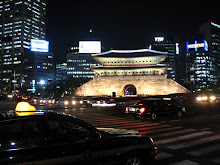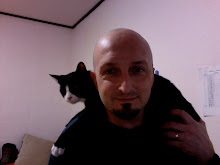 A Stark View
A Stark ViewHwighting! An Ode to Konglish
By Tracey Stark
Originally published in The Groove magazine, Seoul, Korea, February 2007
“More than 350 million people in the world speak English and the rest, it sometimes seems, try to,” Bill Bryson writes in his book The Mother Tongue: English & How It Got That Way.
In Korea, English is a multi-million dollar a year industry. But what happens when you mix the Korean language’s syntax with a limited English vocabulary?
Answer: You end up with a pidgin known locally as Konglish.
The rise in Konglish has resulted in the creation of English-based phrases used in a uniquely Korean way. Terms like “level-up” instead of upgrade, “hwighting” instead of go for it, and referring to a person as a “mania” of something instead of the something being the mania (or the person being a maniac for that matter). The list goes on and new phrases arise all the time.
A great example of Konglish in its written form can be found at the western entrance to Itaewon (the side coming from the army base), on the left hand side, near the big map of the neighborhood. Here is just the first sentence of it:
“As for Itaewon dong that the Han River is located at south and the Mt. Nam is located at north, Dong name originated from the fact that the post-town in which is Itaewon existed at Chosun era (14C).”
This example perhaps best illustrates how translations can go terribly wrong. If you haven’t seen this sign, I strongly suggest you make a pilgrimage to it the next time you are in Itaewon. When read aloud by a mildly inebriated native English speaker, it has a strong intoxicating effect, leaving the reader befuddled and perhaps slightly drunker.
Restaurants and other businesses sometimes seem to advertise their wares in Konglish/English to appear more sophisticated to non-English speakers. Bars with signs that read “Live and Hof” signify that they are more international in nature than a pojangmacha, because they are using both English and German to advertise their offerings. I have yet to figure out what they mean by “Live.”
Or else they translate their menus directly into English using the first word on offer in their bilingual dictionary - “Ooh, look! Rice with spawn! Sounds delicious.”
Restaurants with creative names like “Born to Be Chicken” near Seoul Station, “Sexy Pig” in Hongdae, and “Donkey Fried Chicken” abound. Knock-offs of Western retailers like “Foot Rocker” proliferate. And misspelled translations made into expensive-looking signs like the “Cigalettes” stands along the main road near City Hall are also common.
While admiring the sheer number of places with such names, one has to ask if this is not a marketing ploy to lure you in instead of the result of ignorance, over-ambitiousness or an innocent mistake on the part of some of these merchants.
A case in point is a little clothing boutique in Itaewon called “Make Yourself Fucking Lovely.” The owner speaks some English and is savvy enough to know her sign alone will attract foreigners and her engaging personality as well as sense of style will entice them to spend.
“More than 350 million people in the world speak English and the rest, it sometimes seems, try to,” Bill Bryson writes in his book The Mother Tongue: English & How It Got That Way.
In Korea, English is a multi-million dollar a year industry. But what happens when you mix the Korean language’s syntax with a limited English vocabulary?
Answer: You end up with a pidgin known locally as Konglish.
The rise in Konglish has resulted in the creation of English-based phrases used in a uniquely Korean way. Terms like “level-up” instead of upgrade, “hwighting” instead of go for it, and referring to a person as a “mania” of something instead of the something being the mania (or the person being a maniac for that matter). The list goes on and new phrases arise all the time.
A great example of Konglish in its written form can be found at the western entrance to Itaewon (the side coming from the army base), on the left hand side, near the big map of the neighborhood. Here is just the first sentence of it:
“As for Itaewon dong that the Han River is located at south and the Mt. Nam is located at north, Dong name originated from the fact that the post-town in which is Itaewon existed at Chosun era (14C).”
This example perhaps best illustrates how translations can go terribly wrong. If you haven’t seen this sign, I strongly suggest you make a pilgrimage to it the next time you are in Itaewon. When read aloud by a mildly inebriated native English speaker, it has a strong intoxicating effect, leaving the reader befuddled and perhaps slightly drunker.
Restaurants and other businesses sometimes seem to advertise their wares in Konglish/English to appear more sophisticated to non-English speakers. Bars with signs that read “Live and Hof” signify that they are more international in nature than a pojangmacha, because they are using both English and German to advertise their offerings. I have yet to figure out what they mean by “Live.”
Or else they translate their menus directly into English using the first word on offer in their bilingual dictionary - “Ooh, look! Rice with spawn! Sounds delicious.”
Restaurants with creative names like “Born to Be Chicken” near Seoul Station, “Sexy Pig” in Hongdae, and “Donkey Fried Chicken” abound. Knock-offs of Western retailers like “Foot Rocker” proliferate. And misspelled translations made into expensive-looking signs like the “Cigalettes” stands along the main road near City Hall are also common.
While admiring the sheer number of places with such names, one has to ask if this is not a marketing ploy to lure you in instead of the result of ignorance, over-ambitiousness or an innocent mistake on the part of some of these merchants.
A case in point is a little clothing boutique in Itaewon called “Make Yourself Fucking Lovely.” The owner speaks some English and is savvy enough to know her sign alone will attract foreigners and her engaging personality as well as sense of style will entice them to spend.

English is commonly used in products marketed primarily to Koreans to give them a cachet that regular Korean products do not have. Take my jeans, for example. They boast “genuine quality” and the “energy of denim.” I think I get what they are trying to say, but still find myself shaking my head like I have water in my ears.
But I digress.
I’m a big fan of Konglish. I’m fascinated by it and have tried to write it and speak it, but my innate attachment to English grammar rules will not allow me to think in this particular idiom. My attempts sound silly next to a true practitioner of the dialect, such as an Itaewon cab driver or bartender or most any hagwon director.
And so I removing cap for the Konglish. Let’s having funny times tonight. Hwighting!


